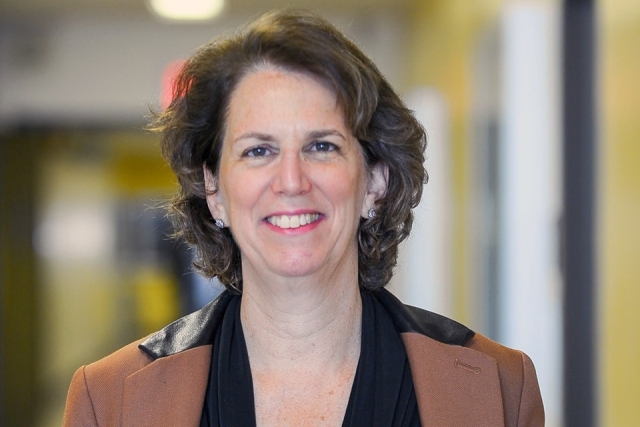

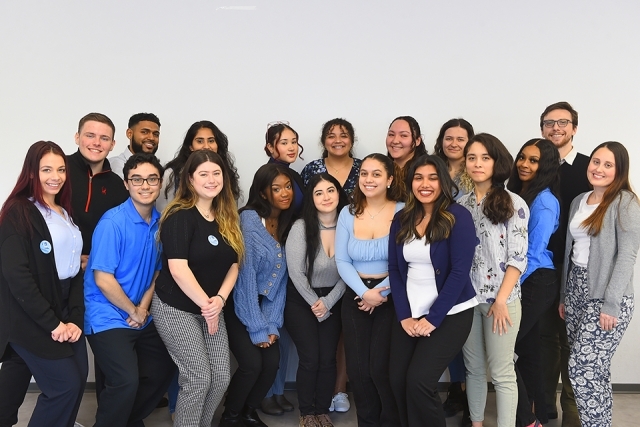

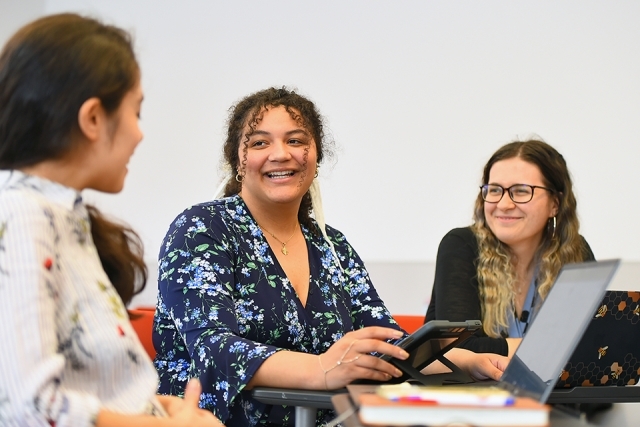

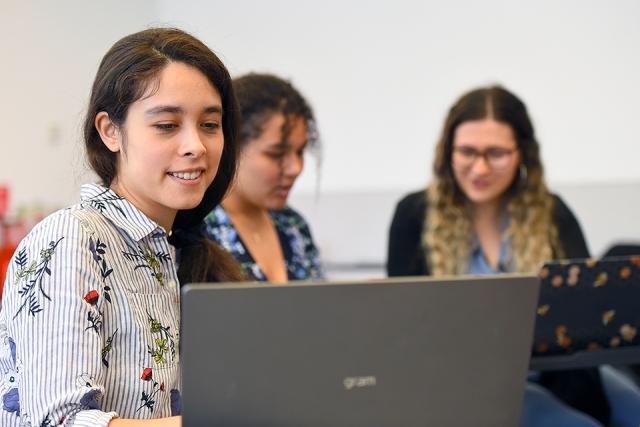

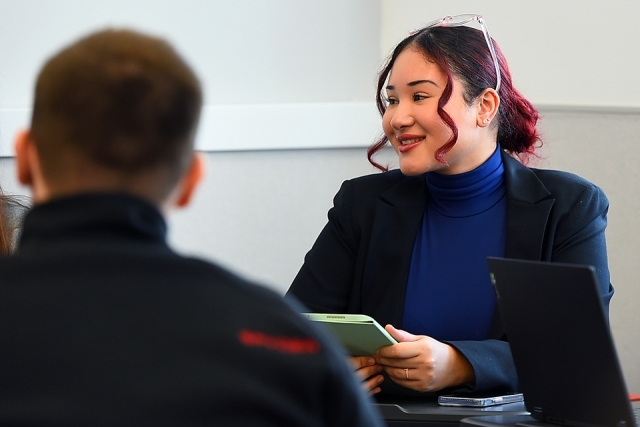
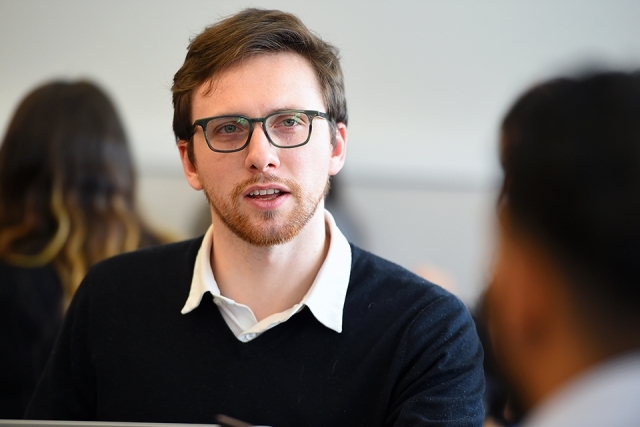














The Collaborative Health Integration Research Program (CHIRP), an interdisciplinary initiative within St. John’s University’s Department of Psychology, uses its research resources to help craft real-world answers to issues facing communities in need—and in doing so, supports the University’s Vincentian mission.
Led by Elizabeth Brondolo, Ph.D., Professor, Department of Psychology, St. John’s College of Liberal Arts and Sciences, teams of St. John’s graduate students from the Department of Psychology and undergraduate students from the Departments of Psychology and Biological Sciences recently tackled three vexing issues in research papers that have been, or soon will be, published. Among the issues explored: the reluctance of medical professionals to discuss spiritual and cultural influences with patients at the end of life; the development of a scale to assess medical professionals’ reluctance to engage in such conversations; and the relationship between racial discrimination and so-called executive function.
The papers were produced in collaboration with Jamaica Hospital Medical Center and NewYork-Presbyterian Queens, whose staffs recognized the research need and allowed the St. John’s teams to collect and analyze the data.
“As psychologists, we ask, ‘why do people do the things that they do?'” Dr. Brondolo said. “We have some ideas, the hospitals have their theories, and we merge them. These hospital-university partnerships are so valuable, and they are a remarkable thing for our students.”
Alexandra Spinelli ’20G, a doctoral candidate from East Rockaway, NY, led a team of student researchers in examining why medical professionals struggle to discuss spiritual and cultural issues with the dying. Officials at NewYork-Presbyterian Queens identified the need among physicians, and Alexandra’s team organized a workshop that included training sessions and surveys. More than 96 percent of the medical professionals attending the workshops said they found the sessions worthwhile.
So why is there a reluctance among medical professionals to discuss faith-based issues with dying patients?
“Doctors and nurses are uncomfortable with the uncertainty that’s in the room of a dying patient,” Alexandra said. “They are more comfortable with ‘certain’ outcomes, and dying patients bring a level of uncertainty.”
Alexandra believes the research, in conjunction with the work of fellow doctoral candidate Luke Keating ’16C in creating a scale to rate medical professionals’ end-of-life communication, can redefine the relationship between physicians and the dying. It is also a way to make real the University’s Vincentian mission of service to the vulnerable.
“Preparing for death is normal in Catholic and Christian cultures, but that’s not so in all cultures,” Alexandra explained. “But what we have found is that patients react to these faith-based, end-of-life conversations very well.”
Luke also worked with Jamaica Hospital Medical Center in examining the impact of discrimination on a set of mental skills broadly called executive function. These skills include flexible thinking, working memory, and self-control. He and his team gathered more than 350 volunteers who reported exposure to discrimination and whose executive functioning was tested.
The result? Recent exposure to discrimination can impact executive functioning, though Luke points out additional research is required to determine how the type of discrimination experienced and its timing impact victims.
“One of the most beneficial parts to me of the program is the soft skills you develop, such as ways of approaching problem-solving, the value of collaboration, and the passion you develop in working on solutions that can create meaningful social change,” Luke said.
Dr. Brondolo said their research will help improve health-care outcomes for minorities and the less fortunate. “The studies grow out of our long-standing research on the effects of discrimination in health care and health-care delivery. That’s why these university-hospital partnerships are so important.”
The hospital partners agree. “Ours has been one of the most rewarding professional collaborations of my career,” said Phyllis August, M.D., M.P.H., of NewYork-Presbyterian Queens. “Dr. Brondolo is passionate about education and research, and we have thoroughly enjoyed the comingling of medical doctors with doctoral students at St. John’s. We have learned from each other as we participate in research on health-equity disparities and hopefully make the world a better place.”
The three research papers are the latest recognition for a program that dates back three decades. CHIRP fellows like Alexandra and Luke gain practical training in the use of research in behavioral medicine with a focus on health-care disparities.
Prior studies have examined physicians’ abilities to regulate their own emotions when dealing with patients at the end of life, how experiences of discrimination shape stress exposure, and the impact of poverty on health outcomes.
CHIRP fellows learn how to design research studies, collect and analyze data, address ethical issues in research, and write and present professional manuscripts and funding proposals. Undergraduates work alongside doctoral candidates in all phases of a research project and take pride in knowing their work can offer tangible improvements in health-care delivery.
“CHIRP gives you a purpose and direction,” said Katelyn Mancheno, a junior majoring in psychology from Flushing, NY. “This program offers you an opportunity to make a contribution.
“It has taken me in a new direction as a student,” Katelyn continued. “It has helped me appreciate things in research I might not have been comfortable with—and that will help me a lot in the future.”
Luke sees another advantage in collaborating with the undergraduate team.
“A big part of it is the mentorship of students,” he said. “It’s incredibly rewarding, and I learn so much in teaching.”
Related News
Answering the Call: Carolyn Moglia Finds Her Stride in St. John’s First Nursing Class
When nursing student Carolyn Moglia walks across the Commencement stage this May, she won’t just be earning a diploma, she’ll be making history. As a member of the first graduating cohort of St. John...
St. John’s Cybersecurity Team Continues Run of Success
For the first time since 2019 and only the second time in its history, St. John’s University’s cybersecurity team has advanced to the regional finals of the Northeast Collegiate Cyber Defense...
St. John’s Conference Highlights Challenges in Insuring of Art and Collectibles
The challenges facing the risk management industry from an evolving art and collectibles sector were the subject of a groundbreaking conference hosted by The Peter J. Tobin College of Business’ Center...
